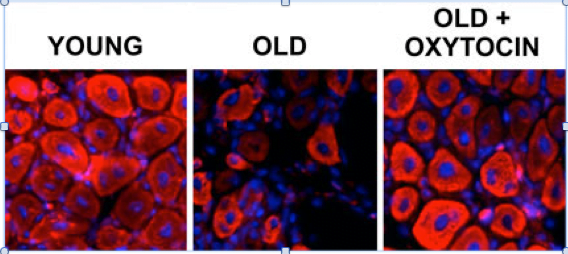“Oxytocin, a hormone, and neuropeptide … plays a major role in attachment processes and serves several purposes: It causes women to go into labor, strengthens attachment, and …[increases] trust and cooperation”. Admir Levine
How Thoughts and Emotions Affect Fascia
Hormones and emotions affect your fascia. What your brain is doing, thinking or feeling directly tightens or relaxes your tissues. When people/healthcare professionals say its all in your head. They are unaware of the physiological connection (science) between the brain and the body.
According to UC Berkley’s study, the hormones called oxytocin or the “love drug.” Oxytocin is secreted into the blood by the pituitary gland, is released when we hug, fall in love, think happy thoughts, play or petting an animal; it is essential in childbirth.
Old cells with oxytocin introduced look like young cells.

The research discovered that oxytocin’s increased the ability of the body to heal and repair muscles after injury. Extra oxytocin’s boosts aged tissue stem cells without making muscle stem cells divide uncontrollably. Boosting stem cells without overgrowth is crucial, as cells that divide uncontrollably are more likely to mutate, turning them into cancerous cells
Oxytocin has been found to slow down the aging process, which indirectly slows down or prevents many diseases such as Parkinson’s, Type 2 diabetes and dementia.
Fascial Stiffness
The release of oxytocin into the bloodstream by the posterior pituitary can reduce inflammatory activity an affecting fascial stiffness and sensitization of fascial nociceptors.
How you feel, what you think, how you breathe can affect your body physically it can change the biochemistry which can lead to stiffness, aging or it can help you be flexible and limber. It’s not all in your head as they used to say, what you think is what you become.
For more information on Fascia Training Institute’s programs please email info@simonefortier.com
If you missed out on any of previous blogs please visit https://www.simonefortier.com/blog/
